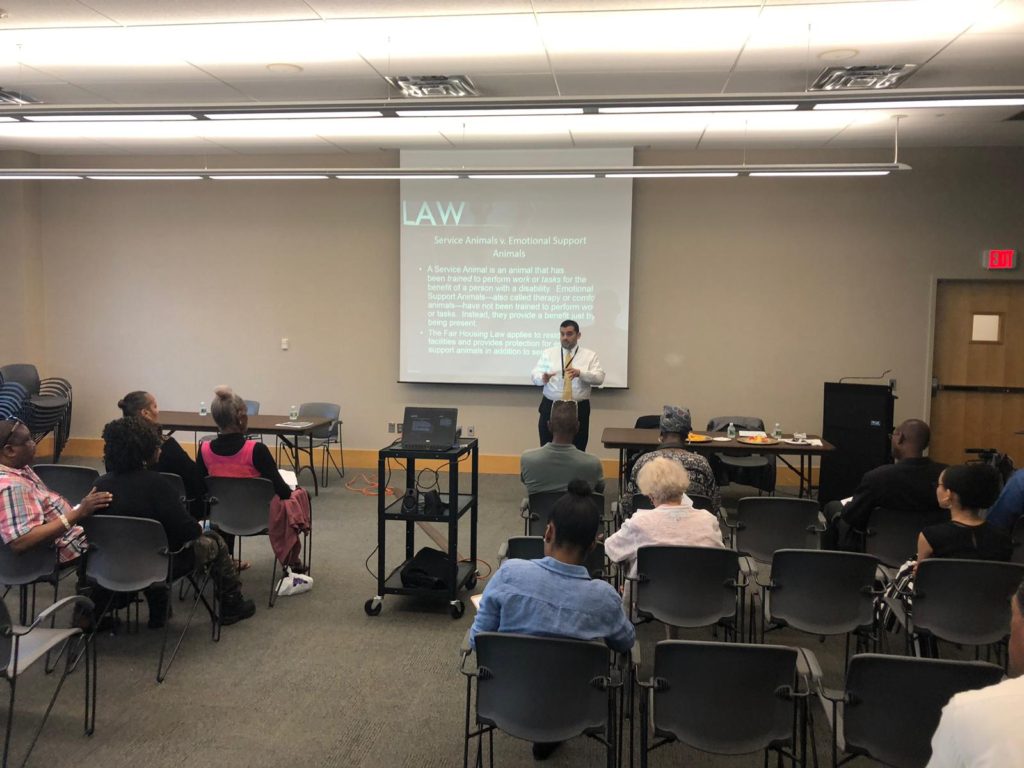
Emmanuel Segarra-Otero, Fair Housing Investigator from Westchester Human Rights Commission, talks about housing laws and protected classes at our May Monthly Housing Workshop.
At a recent event, a person in the audience vented his frustration at me. He was angry that I, that my agency, was not doing enough about housing. He wanted his own home, a place he could call his own. He was sharing a place he considered substandard; one step away from living in a homeless shelter. I knew his story. It doesn’t matter that he worked for most of his life before becoming disabled. It boiled down to one fact: his income was too low to qualify for Westchester’s definition of affordable. He could find a decent rental 350 miles upstate in Cattaraugus County for about $500. But life in rural counties can be very isolating and with his disability, he would be trapped. Or perhaps someday he’ll get Section 8 (Housing Choice Voucher) and pay a third of his income towards rent. . As our Housing Specialist Melissa Lopez- Robles explains “low income does not qualify you for affordable housing in our county, you must have a subsidy.” Unfortunately, the chance of getting Section 8 nowadays is comparable to scoring a lottery jackpot.
Like most other non-profits, Westchester Disabled on the Move is faced daily with juggling our limited resources. We are funded for one Housing Specialist and she is split between a dedicated housing program to help people transition from nursing homes and general housing help. General housing help covers
“I am being evicted next week. What do I do?”
“The new lease says my apartment is no longer rent stabilized. But if I don’t sign it I have nowhere to go”
“I now have to use a wheelchair but my building is not accessible. I can’t afford to move.”
“Can you help me fill out the applications for waiting lists?”
We help fill out applications. We provide information and referrals. We keep our ears to the ground for potential affordable and accessible apartments. We build relationships with property developers and landlords. We do housing workshops. We speak up at hearings for the need for more affordable housing. We advocate! Advocate! Advocate!
But is it enough? The quick answer is an emphatic NO! Often it seems that we are helping only a very small percentage of those in desperate need. The other question is: which one of our other services should we take from to give to Housing: Healthcare Assistance? Benefits Counseling? Nursing Home Transition? The demand for those services already far exceeds funding.
Thanks to organizations like Housing Action Council, we have placed many people in affordable, accessible apartments. And we are proud of that. We have well-attended housing workshops with informative speakers and we want more people to come out. The more that show up the more ammunition we have when we appeal for affordable housing. Legislators, those people who can make change happen, want to see statistics but they need to hear the stories from the people affected. At our Housing Workshops, people speak up. They tell their stories, they share their worries, they swap tips, and the expert speakers answer their difficult questions.
Right now we cannot promise anyone an affordable accessible place to live. We can promise that if we have you in our database and something comes up that matches your info, we will do our fighting best to get you into that apartment. One Apartment at a Time. Sometimes it seems we are chipping away at Mt. Everest. But we know for the family that gets in that life-changing apartment, it is just like winning a jackpot.